I was awakened by the strong smell of aromatic spices and Biko’s voice asking me if I wanted to have lunch. “I’m not hungry yet,” I replied to my husband without opening my eyes and fell back to sleep.
We had left very early in the morning from Cairo and the three hours of sleep at the airport hotel had not been enough. Biko and his sister were my companions in the three-seat row on the flight from Egypt to Yemen. I had called dibs on the window seat because I was determined to see the Nile from the air, but the heat and lack of sleep had won the battle and I had fallen asleep before taking off.
When I opened my eyes again, I saw a highway with water on both sides. We were landing in Aden, in the south of Yemen, and later Biko explained this highway connects both sides of the city. It was my first time in an Arab country, my first time wearing a hijab, and my first time meeting my husband’s family. After so many video calls I was excited to meet them, but I was also nervous. Who wouldn’t be?
The airport in Aden is small, and we got off the plane from a metal staircase directly to the runway. When I took the first step down, the contrast between the AC on the plane and the heat, humidity, and midday Adeni sunshine was so abrupt that all my senses were awakened in an instant. We were in Yemen, a country that five years before, I didn’t know existed. A country that within five years had turned from a complete stranger to an integral part of my life. Slowly, Yemeni food had become part of my diet, I had learned the traditional dance, and I had become a fan of the strong and sweet tea our friends would prepare after dinner.
I don’t remember how long it took us from the runway to the building where we did customs. After three years, my memories of that day are like disconnected scenes of an incomplete old movie reel. My memory has unilaterally chosen which scenes to keep, using a selection criterion unknown to me. So, before my memory decides to delete some more, I think it’s a good idea to write them down, just in case.
The next thing I remember is the immigration officer, who didn’t pay me the slightest attention. Biko gave him our passports and explained he was traveling with his sister and wife. I couldn’t follow the conversation in Arabic. Other than As-salamu alaikum to say hello and shukran to say thank you, my knowledge of Arabic was limited to a bunch of words that sound the same in Arabic and Spanish, due to the Muslim ruling in the Spanish peninsula from the 8th to the 15th centuries.1 I heard Biko saying Argentiniia, stretching the last i, and showing the officer the passport page where my visa was stamped. Without looking at me, the officer gave him the passports back and mumbled “welcome” in English.
In the arrival section of the airport, Biko’s brother and nephew were waiting for us. The eight-year-old boy's excitement when he saw us was enough for me to spot them in a second. He was happy to see his uncle and aunt, but thrilled to confirm I was a real-life person, who also existed outside the cell phone.
“Your bedroom is beautiful”, he told me when we got in the car, mixed with all the other words he knew in English and wanted to practice with me.
When we arrived at the family house, a dozen arms hugged us at the same time. The physical encounter after such a long wait made us all forget about the heat, that in Aden can get up to 104 degrees Fahrenheit. I never know how many kisses to give. Among Arab women, you are expected to kiss repeatedly on the same cheek, but there is no clear rule on how many. That day, I lost count, and I followed the lead of the experts. “Muah; welcome; muah; how are you? muah; how was the flight?”
Biko’s nephew was right. Our bedroom was beautiful, and we could tell they had taken care of every detail with great love. Heavy curtains to block the sun and heat of the Adeni summer, warm light, and the delicate scent of bakhur, a typical incense in Yemen. We were delighted with the surprise, and everyone was happy we liked it. Biko’s nephew seemed upset though. I was confused. What was wrong? His mum explained they wanted to let us rest and arrange the luggage, but he wanted to stay and play with us. We reassured him we were staying for a month. We’d have plenty of time to spend together.
It was Monday, May 10, and there were two days left of Ramadan, the sacred month for Islam. Ramadan is the ninth month in the lunar year and Muslims fast from dawn to dusk. During Ramadan, daily routines get flipped. People are drowsy during the day, work starts later, and afternoon naps are longer. At sunset when people break the fast, the city wakes up. After iftar, the first meal of the day, people go visit relatives and friends, and shops maximize their sales until dawn.
By the evening, we all gathered in the dining room and broke the fast with dates, before sharing falafel, sambusa, and soup made of wheat and lamb. “What’s your favorite Yemeni food?” Biko’s sister asked me. “Sayadia”, I replied without hesitation. A rice and tuna dish that tastes like heaven. I think it’s accurate to say it’s my favorite food, of all, and delete the word Yemeni from the sentence. The family applauded my answer and laughed.
Now we all had more energy to chat, and Biko and his siblings accepted their role as interpreters so no one would miss a word. Among family anecdotes and the retelling of our wedding day in New Jersey, which the whole family had seen live on Instagram, it was time for presents. It seemed to me that the American gifts and the Argentinian sweets we had brought felt embarrassed when the door opened and the blue suitcase, carried by Biko’s sister, made its entrance to the dining room. “For you”, she shyly whispered in English, and the room went silent, holding their breath, waiting for my reaction.
My eyes reached for Biko, begging for help. What did the suitcase mean? But he was only willing to offer a smile back.
I opened the suitcase without knowing what to expect. Night and casual dresses; sandals, slippers, and pajamas; a gold neckless and hearings; more jewelry for parties; bakhur, creams, and perfumes, all handmade by the women in the family. It was a trousseau. A gorgeous trousseau. No thank you, gracias, or shukran would do justice to what I wanted to say. I had no words. But I guess in those moments of blissfulness, the look in one's eyes and the jubilant smile are enough to convey pure gratitude and there was no need for translation.
The conversation continued for a few hours until those closer to the kitchen interrupted it with a loud cheer. Biko’s nieces carefully placed two giant round plates on the sufra, like a tablecloth for the floor. It was sayadia. Just when I thought there were no more surprises left that day!
I hope our Yemeni friends in the U.S. can forgive me. They make delicious sayadia. But the one we had that night was unmatchable. Aden rests by the shores of the Arab sea and fresh fish is one of the main ingredients in the Adeni cuisine. Add locally grown vegetables to the menu, combine all ingredients with ancient traditions, and the result is a delicacy.
Anyone would think the day had been eventful enough, but we were not ready to go to bed yet. Biko was eager to show me the city. The temperature doesn’t drop much during the night, but a few degrees down makes the night the best time to go out. Biko’s nephews decided on the route and his nieces chose the music. We rode the Ma’lla main street, a Manhattan-like avenue, and saw the Sira Castle on top of the hill. The beach of Sahel Abyan was our last stop, just before sunrise. We weren’t the only ones. A bunch of kids were playing with a ball while their parents sat on the stone wall, and a group of women were getting their feet wet in the cool morning sea.
The car, the music, the laugh, the sand, the kids playing ball. It was so familiar. It could have easily been a scene at the lagoon in Junin, my hometown. Or anywhere else in the world. I reminded myself that I was in Aden. I was in Yemen. A strange country I was slowly getting to know more. At the shore of a sea I was seeing for the first time.
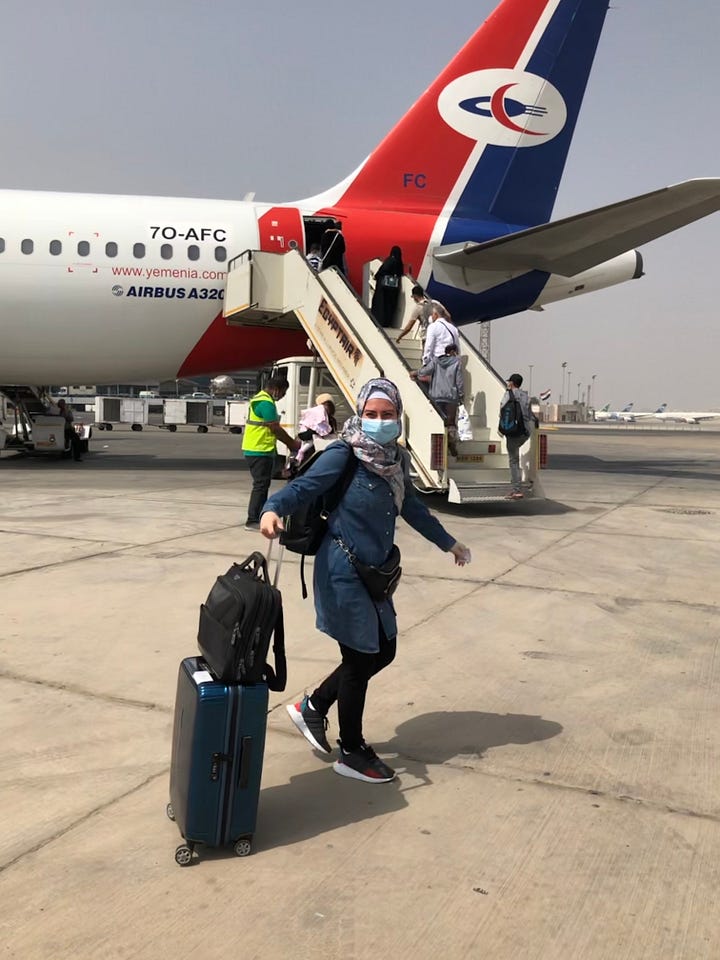
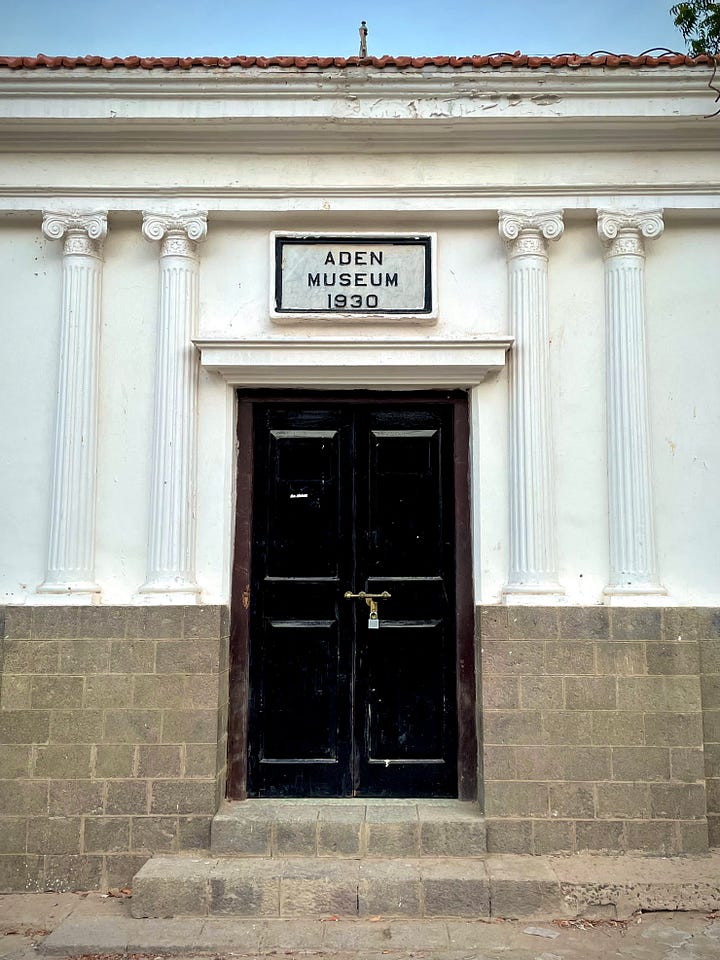
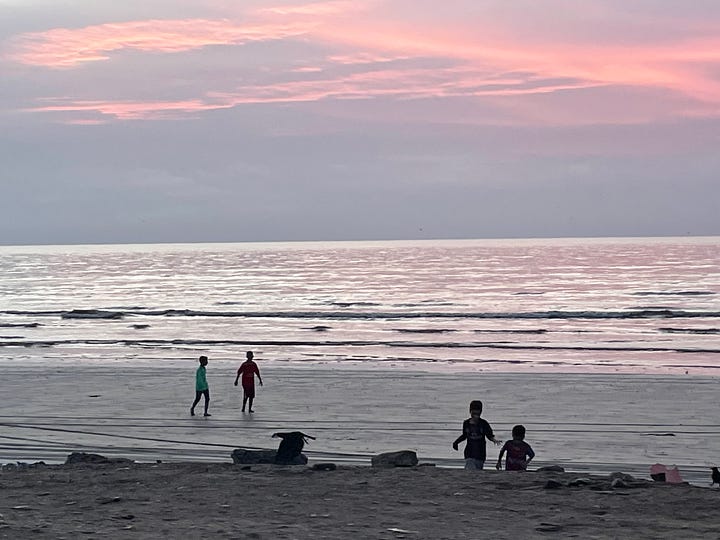
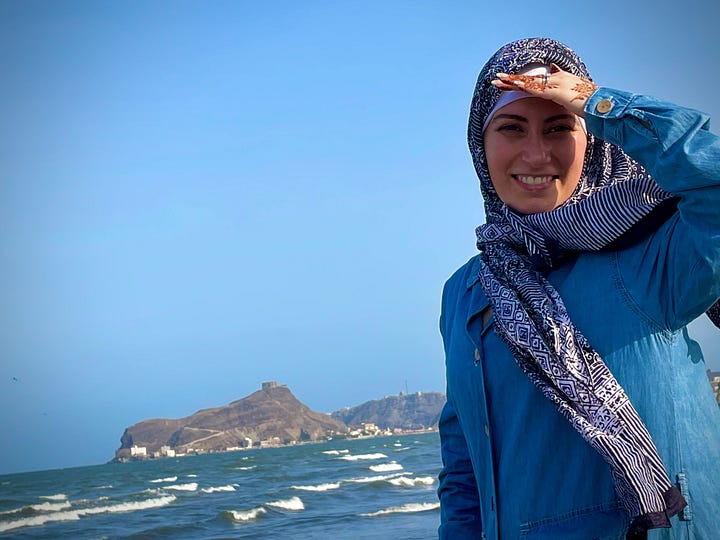
Thank you for reading me!
Until the next story.
Pia
If you love history as much as I do, don’t miss this article about the influence of Arabic on the Spanish Language. Did you know that about 4,000 words of modern Spanish come from Arabic?!
If you’ve enjoyed this post, you can share it with others who you think might enjoy it too.
If you haven’t subscribed yet and would like to read more about my trip to Yemen, you can subscribe below. I share a new story every other weekend.

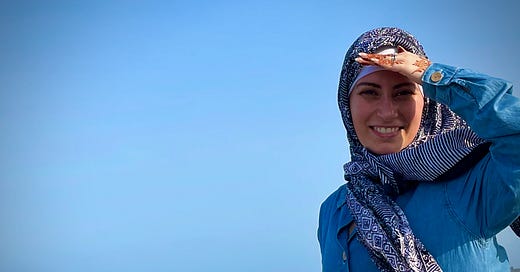


Wow Pia, I was absolutely captivated from the first line. Your writing transported me. I could feel the warmth of Aden, the tension and joy of first meetings, and the deep tenderness in every detail you chose to share. It was more than just a travel memory; it was an invitation into your world, your perspective, and your heart. I felt your emotions, your awe, and your gratitude in every scene. Thank you for this breathtaking piece—it was a joy to read, and I didn’t want it to end.
Love it love it